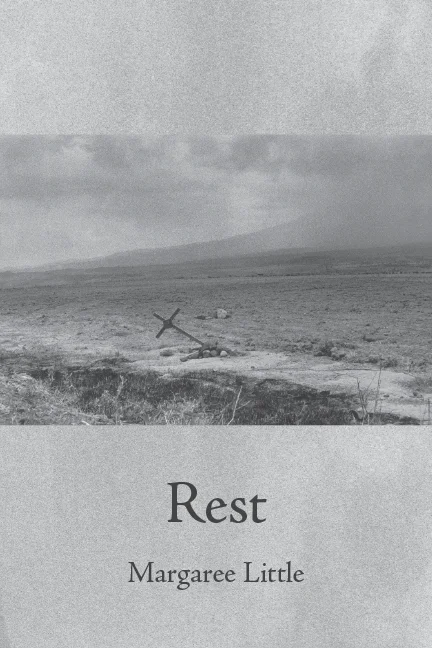A debut collection unfolding from the discovery of one man’s body in the desert along the U.S./ Mexico border
Rest is a vivid, powerful collection examining the human cost of crossing the border. In 2010, Margaree Little was working for a humanitarian mission near Tucson when, along with a group of volunteers, she found the unidentified body of a man, who a medical examiner would later estimate died at least six months before. This discovery serves as the jumping-off point to a stunning, elegiac series of poems commemorating an imagined, unknown life. Anchored by Little’s keen eye and unsparing self-reflection, this collection asks us to examine how a single life can affect so many others.
--Four Way Books
Four Way Books, 2018
Winner of the 2018 Balcones Poetry Prize
Winner of the 2019 Audre Lorde Award for Lesbian Poetry
Longlisted for The Believer Book Award
A 2018 Top Spring Poetry selection from Library Journal
A featured poetry title in Publishers Weekly's Spring 2018 Announcement
Available from Four Way Books
“Rest is a searching, lyrical meditation…Little transforms her poems of witness into profound considerations of ethics and the worth of the Other. She elegantly and forcefully…uses a single encounter to bring the reader into a larger historical situation, while she keeps rotating the ethical lens…, questioning even herself and the act of writing.”—Balcones Poetry Prize Award Citation
“Unerring cadences, an arroyo of words awash in grief for our closed borders, the many lost whose hopes the Southwest desert claimed, who ‘walked in circles first…certain that this way, yes/this way was north;’ these haunting poems build phrase by phrase, hypnotic, obsessive return to ‘the man we found,’ ‘how his eyes were gone, how through that space/ the earth could look out...’ Like vigil candles placed on improvised altars, these poems bear witness as they burn and burn.”—Eleanor Wilner
“Framing Rest is a list of the 253 bodies discovered along the Arizona-Mexico border in a single year. At its center is one body that, through an imaginative act simultaneously embraced and resisted, becomes the story of a man, a story at once personal and political, a story through which Margaree Little discovers her own story. ‘There’s no secret to this,’ she says, ‘You look for a trail and then follow it.’ Yet these bracing, vulnerable poems embody the central mystery of poetry: what was riven is made whole.”—James Longenbach
"Unraveling from an encounter with a man’s remains on the Arizona-Mexico border, this collection asks hard questions: of what are his remains evidence? What does it matter that another person has been lost if I never imagined he was mine to lose? What does the loss of a person, or many people, mean? These poems offer a wildly intelligent mind confronting its own responses as it grapples with intimacy, responsibility, and care. Margaree Little’s voice is poised, alert, and remarkably discerning, even in facing the most anguished bewilderments. No book has done more to help me feel that 'to be familiar with' is not the same as 'to know.' Writing deeply, skillfully into and sometimes against lyric techniques, she is a poet of conscience who sounds like no one else; the pulse of her lines quietly enthralls. This is formidable, vital, human work."—Mary Szybist
“What does it mean to carry a death we do not know, yet nonetheless becomes part of us? 'We found a body, I said, though I knew that wasn't right. / There must have been something of a man left in him // or the sheriff wouldn't have held each part of him / at arm's length, lifting, before he dropped it in the bag.' Margaree Little's Rest is a profoundly restless book of poems, haunted, elegiac, and full of troubled rain. Set in Arizona, on the borderlands between countries, Rest is part noir mystery, part documentary, and part elegy—set into motion by the poet's discovery of human remains, a body torn of his history and face and name. A deeply ethical book of poems, Rest keeps returning to this unknowable man's body and history, inviting us to consider the terrible human cost of undocumented migrancy, and the moral cost of forgetting.”—Philip Metres
"While working for a humanitarian mission near Tucson, AZ, Little and a group of colleagues discovered the remains of an unidentified man in the desert who had been dead at least six months. That sobering discovery (“my friends and I carried the man we found/ together, the forty pounds of him”) inspired this accomplished first collection. It opens with Little’s mission work and expands to envision the deceased’s life at home (“If not the cane fields, …/ it could have been a city with white walls”), his arduous journey (“he carried a river on his back and drank from/ it that whole walk through the desert”), and the terrible what-ifs (what if “he went back home,…/ never put his mouth/ to the gravel here”). Little unflinchingly ponders life, death, and this hard world but offers succor, too: the piano music resounding throughout, Betty’s minestrone soup. VERDICT An important story affecting and effective in its simplicity." —Library Journal
"...The poems in this collection rely on the practiced art of imaginative instinct; the passage above is a representation of that painstaking, devoted desire to elegize, to clean deep psychic wounds, which is a craft in itself." —Andrea Syzdek for the Kenyon Review
